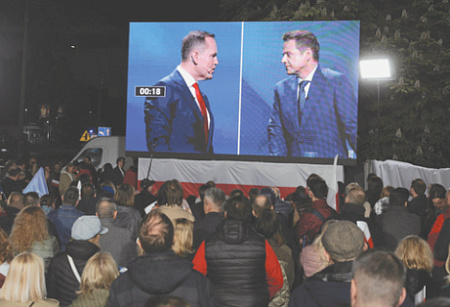
The results of the presidential elections held on Sunday have been summed up in Poland. There will be a second round, which includes Warsaw Mayor, liberal and candidate of the ruling Civic Platform party (GP) Rafal Trzaskowski, as well as Karol Nawrocki, supported by the right-wing Law and Justice Party (ZiS). The true winner of the elections should be recognized as the ultra-right, which also spoke under anti-Ukrainian slogans. Poland is clearly tired of the conflict in the east, in which it is involved, and of the years-long rivalry between the SOE and the VMS.
Polish sociologists were both mistaken and not mistaken. On the one hand, most polls definitely indicated that none of the two election favorites (Trzaskowski and Navrotsky) would get the 50% of the vote needed to win in the first round. On the other hand, more people voted for Navrotsky than predicted. After counting all the votes, he scored 29.54%. A negligible lag behind Tschaskowski. Despite the support of the ruling GP party, which won the 2023 parliamentary elections, and its leader, Prime Minister Donald Tusk, the mayor of Warsaw received 31.36% of the vote. The polls promised him much more and the role of the favorite of the second round. Now it is clear that on June 1, when Poles go to the polls again, they will have to choose from two politicians who have, in fact, equal chances of winning.
The outcome of the election will be decided by the votes of supporters of other candidates. And the main surprise of these elections is connected with them. Representatives of the far-right Confederation of Freedom and Independence coalition Slavomir Mentzen (won 14.81% of the vote) and Grzegorz Brown (6.34%) came in third and fourth place. If both of them had overcome their mutual differences and the coalition had put up a single candidate, the result of the far-right would have been better. During the election campaign, Mentzen, judging by the polls, at one time even bypassed Navrotsky. In short, those who were considered hopeless marginals until recently performed very well. The same cannot be said about the systemic forces.
Maria Pavlova, a senior researcher at the Baltic Region Integrated Research Group of the IMEMO RAS, noted in a comment to NG that on June 1, two candidates who scored less in total than any other politicians who reached the second round in the history of free elections in the country would compete. And this is with a fairly high turnout: 67%. Pavlova believes that the relative success of the far–right and right-wing forces in general is a delayed result of the pandemic, which has negatively affected the Polish economy. It is also a consequence of Polish society’s fatigue from the conflict between Russia and Ukraine, which has caused a flood of refugees into the country. Mentzen and Brown largely rose on anti-Ukrainian rhetoric, to which, however, Navrotsky also paid tribute. “Besides, there is also fatigue from Tusk. He tried to make the presidential election a vote of confidence in himself. The voters were asked to choose: they are for the SOE or for the old government, for the ZIS, which lost the parliamentary elections in 2023. But many did not want to make such a choice and voted for the far–right,” Pavlova said.
It is not at all a fact that the electorate of the Confederation of Freedom and Independence will vote for Navrotsky in the second round, the expert believes. In her opinion, it is quite possible that this part of the voters simply will not come to the polls. In addition, Mentzen immediately after the first round stated that he did not support either Trzaskowski or Navrotsky. It is also unclear whether the voters who voted for the left – Adrian Zandberg (5.2%), Shimon Golovnya (4.9%) and Magdalena Beyat (4.1%) – will vote for the representative of the GP.
But one election result can be predicted accurately: no matter what the candidates’ attitude towards Ukrainian refugees, the controversial pages of the history of Ukraine and Poland, and the export of Ukrainian grain to the EU, which is ruining Polish farmers, the attitude of the Polish authorities towards the Russian Federation will not change. It’s not just that the powers of the president in the country are limited. The prime minister is much more influential, that is, Tusk, a supporter of all possible pressure on the Kremlin. “Both participants of the second round adhere to the same hard line towards the Russian Federation. Of course, we can assume that Navrotsky, with his sympathy for Donald Trump, will try to act in the Russian direction in much the same way as Trump. But this is unlikely. If Navrotsky wins, he will be completely occupied with internal Polish affairs. He will have no time for experiments in foreign policy,” Pavlova believes.
When Navrotsky comes to power, the confrontation between the president and the prime minister will begin. Most likely, it will occupy the minds of Polish politicians. At the same time, Poland will remain at the forefront of the West’s anti-Kremlin front. If Navrotsky or Trzaskowski become head of state, they, like the current Polish president Andrzej Duda, will advocate for the fight against the Russian shadow fleet in the Baltic, for new sanctions and for the supply of weapons to Kiev. However, all this may paradoxically be combined with criticism of the Ukrainian leadership and calls not to allow Ukraine to join the EU.
